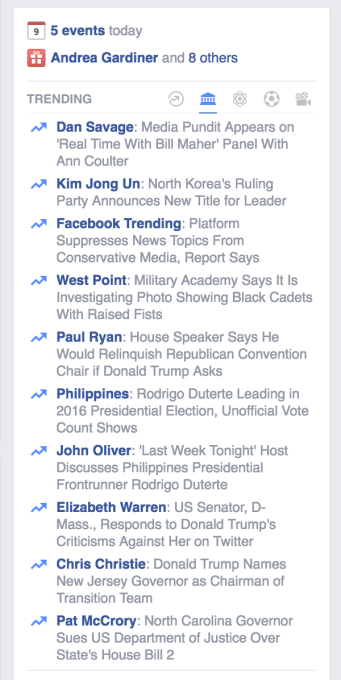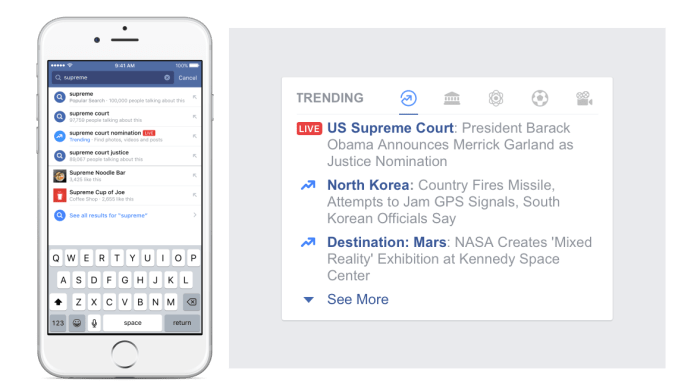

Facebook is now strongly refuting claims that it suppressed conservative Trends after issuing a more vague and indirect PR statement earlier today about having neutrality guidelines.

Facebook VP of search Tom Stocky
Facebook has “found no evidence that the anonymous allegations are true” wrote VP of search Tom Stocky on the social network tonight at 9:30pm pacific May 9th, regarding a Gizmodo report from sources who said they were formerly on the team that chose what Trends appeared on Facebook’s site.
“Facebook does not allow or advise our reviewers to systematically discriminate against sources of any ideological origin and we’ve designed our tools to make that technically not feasible. At the same time, our reviewers’ actions are logged and reviewed, and violating our guidelines is a fireable offense.”
[Update 10pm pacific, May 10th: This article has been significantly updated to reflect the new statement released by Facebook VP Tom Stocky directly refuting the claims of biased trends.]
Facebook’s earlier statement about having neutrality guidelines left it unclear whether any contractors hired to curate the trend had potentially violated those rules. But now Stocky’s statement bluntly calls into question the allegations by Gizmodo’s sources.
Here’s Stocky’s full statement:
“My team is responsible for Trending Topics, and I want to address today’s reports alleging that Facebook contractors manipulated Trending Topics to suppress stories of interest to conservatives. We take these reports extremely seriously, and have found no evidence that the anonymous allegations are true.
Facebook is a platform for people and perspectives from across the political spectrum. There are rigorous guidelines in place for the review team to ensure consistency and neutrality. These guidelines do not permit the suppression of political perspectives. Nor do they permit the prioritization of one viewpoint over another or one news outlet over another. These guidelines do not prohibit any news outlet from appearing in Trending Topics.
Trending Topics is designed to showcase the current conversation happening on Facebook. Popular topics are first surfaced by an algorithm, then audited by review team members to confirm that the topics are in fact trending news in the real world and not, for example, similar-sounding topics or misnomers.
We are proud that, in 2015, the US election was the most talked-about subject on Facebook, and we want to encourage that robust political discussion from all sides. We have in place strict guidelines for our trending topic reviewers as they audit topics surfaced algorithmically: reviewers are required to accept topics that reflect real world events, and are instructed to disregard junk or duplicate topics, hoaxes, or subjects with insufficient sources. Facebook does not allow or advise our reviewers to systematically discriminate against sources of any ideological origin and we’ve designed our tools to make that technically not feasible. At the same time, our reviewers’ actions are logged and reviewed, and violating our guidelines is a fireable offense.
There have been other anonymous allegations — for instance that we artificially forced #BlackLivesMatter to trend. We looked into that charge and found that it is untrue. We do not insert stories artificially into trending topics, and do not instruct our reviewers to do so. Our guidelines do permit reviewers to take steps to make topics more coherent, such as combining related topics into a single event (such as #starwars and#maythefourthbewithyou), to deliver a more integrated experience.
Our review guidelines for Trending Topics are under constant review, and we will continue to look for improvements. We will also keep looking into any questions about Trending Topics to ensure that people are matched with the stories that are predicted to be the most interesting to them, and to be sure that our methods are as neutral and effective as possible.”
Stocky’s explanation suggests that Gizmodo’s sources may have exaggerated the claims.
Facebook’s assertions here mesh with a report from the New York Times this evening that says a former employees of Facebook’s trend curation team told it that “Any ‘suppression,’…was based on perceived credibility — any articles judged by curators to be unreliable or poorly sourced, whether left-leaning or right-leaning, were avoided, though this was a personal judgment call.”
It’s possible that what was perceived as suppression may have been shortcomings of the algorithm or hesitation to display Trends based on news outlets not deemed to be credible.
Facebook Cites Neutrality Guidelines In Initial Statement
At 1pm pacific May 9th, Facebook said in a statement to TechCrunch that it was against the company’s curation policy to suppress or prioritize specific political views in its Trending topics, and that it has guidelines in place to preserve consistency and neutrality there. This would imply that any issue arose from deviation from these guidelines on the part of contractors paid to curate the trends it shows.
In the statement responding to Gizmodo’s report that conservative trends were suppressed in Facebook’s Trending section, Facebook wrote:
“We take allegations of bias very seriously. Facebook is a platform for people and perspectives from across the political spectrum. Trending Topics shows you the popular topics and hashtags that are being talked about on Facebook. There are rigorous guidelines in place for the review team to ensure consistency and neutrality. These guidelines do not permit the suppression of political perspectives. Nor do they permit the prioritization of one viewpoint over another or one news outlet over another. These guidelines do not prohibit any news outlet from appearing in Trending Topics.”
 Former Facebook “news curators” told Gizmodo they were instructed to “inject” certain stories to make them appear to be Trending news topics on the platform’s homepage and search results, even if they weren’t that popular.
Former Facebook “news curators” told Gizmodo they were instructed to “inject” certain stories to make them appear to be Trending news topics on the platform’s homepage and search results, even if they weren’t that popular.
That’s a somewhat understandable practice as Facebook sought to improve its trends algorithm. If something was important but not yet generating loads of discussion on Facebook, or wasn’t getting picked up by the algorithm, Facebook’s editors may have added the trend artificially.
Facebook was also said to have discouraged inclusion of trends about Facebook itself. That could have been done to avoid self-promotion or to offset the propensity for Facebook users to talk about Facebook. But it also could have suppressed negative stories about Facebook.
Most damning were the accusations by former workers that some trending stories were suppressed if they didn’t agree with the political views of the contracted curators controlling the trending topics feed — especially if the stories were conservative. Though Gizmodo didn’t claim that this bias was mandated from higher-ups, Facebook’s neutrality guidelines should have prevented this from happening.
“I’d come on shift and I’d discover that CPAC or Mitt Romney or Glenn Beck or popular conservative topics wouldn’t be trending because either the curator didn’t recognize the news topic or it was like they had a bias against Ted Cruz,” one former employee who wished to remain anonymous told Gizmodo.
The news outlet published an earlier piece about these same “curators” and their harsh working conditions, calling the company out on degrading conditions — stuck in a conference room for months, forced to speed write quick hits to fill out the trending portion found on the upper right side of Facebook’s site.
What we have from the report is anecdotal and it’s tough to know what’s going on. Facebook’s biggest problem may have been not realizing humans have biases — including political ones.

Though it may have had neutrality guidelines in place about how to curate the trends, it’s possible that contractors with inherent biases were placed on the team, then went on to bend or break the rules. A more rigorous oversight system may be necessary to ensure that the neutrality guidelines are strictly followed.
But as Stocky writes, training and technical systems were both in place to prevent bias leaking into the Trends, and all actions by curators were logged.
The whole issue is alarming because Facebook has grown to become a core way people discover news. It drives so much traffic that news outlets are pressured into publishing on the platform. Bias on the part of the platform itself could impact the minds of its 1.65 billion users.
The fact is that the employees of Facebook itself do lean liberal. At a 2011 town hall talk where Mark Zuckerberg interviewed Barack Obama at Facebook headquarters, employees could be heard loudly cheering for pro-Democrat statements and anti-Republican jabs from the president.
With the 2016 presidential election coming up, Facebook has enormous power to sway the populace. It will need to convince the public it can remain neutral, or it opens itself up to stern criticism, lost political ad dollars and increasing skepticism about its stronghold on the distribution of information.
At this point, the report has already done significant damage to Facebook’s reputation with conservatives, and increased fears that it manipulates the world. Even if its records show no evidence of tampering with Trends, the perception of bias could haunt the company through the election season.

